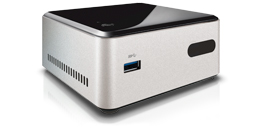Id: Difference between revisions
| Line 3: | Line 3: | ||
== What is an Id? == |
== What is an Id? == |
||
The JRiver Id is a networked audio player that plays from your computer. You can control it from your phone. |
The JRiver Id is a networked audio player that plays high quality audio from your computer. You can control it from your phone. |
||
The name came from the idea JRiver had for an |
The name came from the idea JRiver had for an '''I'''maginary '''d'''evice. Imagine a few of these around your home. You can play to them from a computer or stand-alone. |
||
| ⚫ | |||
| ⚫ | |||
== Intel Hardware == |
== Intel Hardware == |
||
Revision as of 21:13, 2 May 2014
What is an Id?
The JRiver Id is a networked audio player that plays high quality audio from your computer. You can control it from your phone.
The name came from the idea JRiver had for an Imaginary device. Imagine a few of these around your home. You can play to them from a computer or stand-alone.
At $395, it's very affordable.
Intel Hardware
The Id is based on the Intel NUC. It's small (4"x4.5"x2"). It's cool and quiet.
JRiver Software
The Id is powered by JRiver Media Center, running on Linux. The software can automatically update itself.
More Details
The Id performs all of these functions:
DLNA Renderer -- When connected to an amplifier or DAC, you can play to it from any DLNA Server.
DLNA Server -- It can host your files and serve them to any DLNA Renderer.
Portable Media Player -- The Id can stand alone and play to any audio amplifier or DAC. It has a 120GB SSD drive. The software takes about 20GB, so you have 100GB of storage. It runs a Samba Server, so you can copy files to it from a PC or Mac.
Audio output via HDMI, 1/8" Stereo analog, or USB.
The Id has 2GB of RAM and 120GB SSD drive. The processor is a Celeron.
USB (3.0 (1) and 2.0 (2)), wired and wireless Ethernet, Bluetooth and WiDi.
You can read more about the at Intel.
